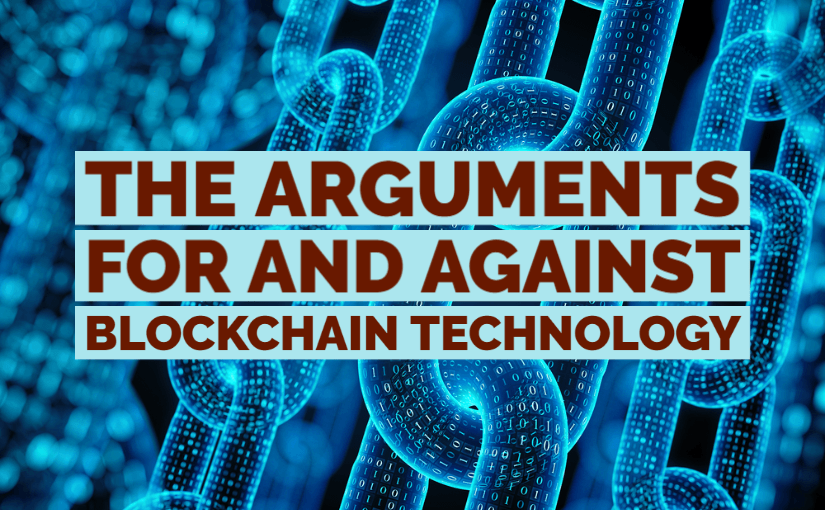The Arguments for And Against Blockchain Technology

Much has been said about the versatility of blockchain infrastructures and how they enable solutions that evade the bottlenecks prevalent in legacy systems. Although this sentiment remains a popular view, experts have begun to see beyond the hype and analyze the real value of implemented blockchain systems. In reality, the more we understand the benefits and limitations of blockchain technology, the easier it is to fast-track the implementation of these systems. Until then, issues relating to ethics and the long-term viability of blockchain will remain major talking points.
In light of this, I will explore various views regarding the pain points of blockchain technology and the chances that it will live up to its hype.
Blockchain Is Dynamic Enough to Kickstart A Revolution
Now and then, humanity searches for new paradigms that would drive its next phase of development. A couple of decades ago, the internet emerged as a potent enabler of innovation. Thanks to its emergence, we have discovered more efficient ways to buy, sell, and communicate. However, before all this, no real expectations trailed the introduction of the internet. As aptly explained by Iqbal V. Gandham, managing director of eToro UK, the internet, at the earliest stage of its existence, garnered a strong following because it seemed interesting and nothing more. It slowly transitioned from a cool idea to a scalable and indispensable part of our daily lives. Gandham stated:

Iqbal V. Gandham, managing director of eToro
“So, we didn’t really need a “use case” for the internet or go as far as to question why it existed. We never once asked: Will the internet scale? We didn’t complain that we couldn’t send a movie over it or that it was too slow at delivering information we needed. Even so, no one suggested that we should switch it off and go home. Instead, we suffered countless hours of failed connection attempts just because we could and because — some of us — had no social life. Fast forward this internet evolution and, eventually, we arrive at e-commerce. Contrary to the way it may seem now, e-commerce arrived slowly but surely. We didn’t need to “go online.” Instead, we just ended up always online. We started to shop. We started to buy and sell. Before we knew it, we had a mass-market use case.”
He added:
“So, the key here is: How does this evolutionary path relate to blockchain and crypto? In crypto, we first need the crypto. With the internet, we needed the connection. In order to access or acquire this crypto, we need the exchanges to sell it to us, which is similar to the ISPs in the internet example. These exchanges will continue to grow, and like ISPs, they too will eventually become commoditized. Like with internet access, the first stage of blockchain is now done. The second wave, similar to broadband, is coming.”
What Gandham means is that blockchain is following a similar evolution trajectory to that of the internet, and it is unfair to completely downplay its disruptive capacity based on its current inability to scale effectively. However, this does not mean that the criticisms leveled against the technology are invalid. All new technologies attract arguments for and against their viability. For instance, let us use AI and the recurring controversies surrounding the transparency of the decision-making processes of algorithms as a case study. Some are of the notion that it is imperative to identify ways to audit and introduce ethics to the analytics processes of AI systems. Similar arguments have emerged in the budding blockchain industry, especially now that enterprises have begun to find ways to introduce blockchain technology to existing infrastructures.
What Are the Arguments for And Against Blockchain Technology?
One of blockchain’s biggest hits is its role in the creation of cryptocurrency. Up until now, bitcoin remains blockchain’s most successful app, and this will likely remain the status quo as long as developers and organizations are yet to register a breakthrough in their quest for establishing interoperability. As such, some believe that blockchain is too cumbersome to power other technologies apart from crypto networks. There is no denying blockchain’s potential as an enabler of financial systems such that traditional organizations are intensifying their efforts to create variations of blockchain-based digital assets. Benedict Chan, Chief technical officer of BitGo, reiterates this sentiment when he acknowledged the impressive capabilities of blockchain in the financial sector. He stated:

Benedict Chan, Chief technical officer of BitGo
“While traditional finance payment rails are efficient at providing financial services within local regions to some individuals, blockchain technology is able to make financial services available to every person with access to the internet. There are now many more individuals than before in developing countries (from India to Indonesia) that have access to an account offering exposure to the movement of USD, commodities, and other financial products.”
Furthermore, a recent survey by auditing giant Deloitte highlights a significant increase in the number of executives who are actively developing blockchain-enabled projects. The research, which surveyed senior executives and entrepreneurs across 14 nations, discovered a 16% rise in the number of organizations embarking on deploying blockchain systems. While responding to this report, John Wu, the president of AVA Labs, described the growth as an indicator of the intensified adoption of blockchain and digital assets. He said:

John Wu, the president of AVA Labs
“Institutions and individuals need to be best equipped to manage financial risks, protect investments, and even grow our assets when the next crisis hits. Widespread adoption of blockchain technology is a significant stepping stone in building a new system robust enough to cope with the challenges that lie ahead, and will reward innovators that take action today. This dramatic and rapid evolution of market structure toward decentralization is rapidly leaving the ‘ifs,’ and becoming a ‘when.’”
Marta Piekarska-Geater, the director of ecosystem for Hyperledger, expressed similar views when she described blockchain’s broad application as a reason why it has enjoyed mainstream acceptance. She explained:

Marta Piekarska-Geater, the director of ecosystem for Hyperledger
“Companies and organizations are turning to blockchain to trace assets and products, trigger and track transactions and create a layer of trust between parties that don’t necessarily trust each other. Blockchain has been proven valuable for a range of use cases, including cross-industry collaboration and consortiums, provenance tracking, managing digital identities in new ways that actually increase privacy and enabling new models for digital financial transactions.”
Notwithstanding, there are doubts that blockchain can produce the same impressive results in other industries. According to a spokesperson of HDR global trading, the parent company of Bitmex, it is hard to utilize blockchain for a majority of non-cryptocurrency uses. The spokesperson asserted:
“Decentralised ledger technology such as blockchain requires every node to have a full copy of the database, and to verify every transaction under consensus rules. This is a complicated data structure, which is slow, inefficient, and resource-intensive to process.”
Beyond being ineffective in other niches, the hype that brought blockchain to the fore has slowly given way. Now, stakeholders are more in tune with the prevailing narratives of blockchain technology and the amount of work required to deliver viable products. Piekarska-Geater described this sudden change in perception as an indicator of maturity across the system and a catalytic drive towards steady growth.
“We managed to go past the ‘blockchain will sell anything,’ and now the industry asks ‘what is the ROI?’ It is not enough to just stick a DLT into your solution to sell your product. And this is a good thing. Initially, the main driver of interest in blockchain solutions was the fact it sold well. Now it is more about the actual business value they bring: the accountability.”
However, she noted that this does not change the fact that blockchain remains in the early stage of development, and it will take a steeper understanding of the technology for it to make meaningful impacts. She asserted:
“Interoperability is definitely on top of everyone’s minds. Another aspect is the limited number of skilled developers. […] With time, we will see more and more students graduating from universities that will be able to join the workforce.”
There is also the issue of ethics and regulatory compliance. A recent publication on Cointelegraph Magazine explored the implications of blockchain’s inherent capacity to provide immutable ledgers. In it, the author, Christina Comben, raised valid concerns over immutability and its effect on the very essence of humanity. Comben opined that immutability remains one of the most controversial features of blockchain technology. She wrote:
“We’ve long been living in a world in which history is documented and human brains are wired to have selective memory. However, with the advent of blockchain technology, we now have a tool to record data that (ideally) cannot be edited, tampered with, or removed. Unlike the pages of a book or an entry in a database, data in the blockchain cannot be altered. In effect, records stored on a blockchain are immutable and live forever. The question of data permanence for many, though, isn’t blockchain’s most salient feature.”
Issues raised in this article include the determining factors of the data stored on a blockchain, how true it is, and whether it is ethical or not to have sensitive information on blockchains without the means to delete it. CryptoKitties developer, Arthur Camara, had once detailed the frightening outlook of immutability, especially at a technical level. He stated:

CryptoKitties developer, Arthur Camara
“Immutability, the inability to be edited, is at once the blockchain’s greatest strength and its largest barrier to meaningful adoption. The pressures of immortal code paralyze developers: you can tinker in a test environment forever, but there will always be real-world variables you can’t anticipate. Covering your eyes and hitting launch is no way to make breakthroughs. It’s more likely to produce breakdowns.”
This assertion is even more frightening if we dig into the validity of the truth factor used to describe the data mining capacity of blockchains. While using the birth of Ethereum Classic as a case study, Joshua Ellul, Chairman of the Malta Digital Innovation Authority (MDIA) and Director of the Center for Distributed Ledger Technologies at the University of Malta, argued that the system that determines data entered into the blockchain and those that are omitted has some flaws. He asserted:

Joshua Ellul, Chairman of the Malta Digital Innovation Authority (MDIA)
“When Ethereum and Ethereum Classic forked, which fork is the real truth, the real Ethereum? The records of that hack are still there, it’s more of a correction of history that took place. This raised serious concerns. Really, it’s not the end users that get to decide (at least in this case). Ultimately the decision is dependent upon the node operators. Are they swayed by popular voices? So, it could well be the person with the most popular voice who decides which version of truth is written.”
He added:
“Centralized voices — even if it was seen as democratic, is it the popular vote that should be defining truth? Is that the right path to be going down? Some people think that the data in a blockchain is the absolute truth, that’s not the case. The data in the blockchain is guaranteed to be as good as its input. It’s the same “garbage in, garbage out” principle that applies and that’s one thing we need to make sure that we disambiguate.”
Ellul further explained the implications of this framework, noting that it concentrates the power to establish the truth and determine what gets left behind to a selected few.
“Say a country decides they will not accept transactions from a country that they do not want to do business with. Could such actors potentially minimize others from participating? It seems like we’re moving to a reality where the majority of computational power writes history, at least for Proof of Work. For Proof of Stake then perhaps we are moving to a reality where the majority of money holders (crypto holders) will be the ones who write the history… They cannot manipulate what you write or write on behalf of you; but they can choose what goes into the blocks. So, this leads to a problem of selective omission.”
Nonetheless, he concluded that this does not necessarily mean that blockchain’s immutability is the problem. On the contrary, it is the human factor that puts this functionality at risk of being abused just as bullying and fraud have become the bane of the internet. Ellul concluded:
“Blockchains are not the problem. Humans are the problem. Blockchain exists whether we like it or not and, at some point, we are going to have to have the debate of whether we really want all that data living forever… And if not, who is it that gets to write history?”
Closing Thoughts
From what we have learned so far, it is safe to say that knowledge is integral to the growth of the blockchain industry. Likewise, there is always a reason to doubt the viability of new-age technologies. And in the case of blockchain, it all boils down to human factors.
